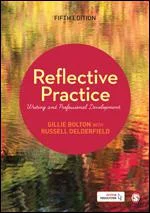This book is currently being offered as a prize in a prize draw for subscribers to Digital Education. The closing date is 2nd July 2018, so subscribe now!
Subtitled Writing and Professional Development, this academic work is very readable. As the title suggests, the authors believe that writing can be a valuable, even crucial, means of reflecting on one’s own professional practice. For those who believe they cannot write, bear in mind that if the writing is for your eyes only then it doesn’t matter in my opinion. But also, writing is a matter of practice too. To use the authors’ words, writers don’t just sit around all day waiting for the muse to strike. Writing is 1% inspiration and 99% perspiration.
I can’t remember who it was, but one writer was asked how he writes, and said “I wait for inspiration.” When asked what he did whilst waiting for inspiration, he answered “I write”. It’s a painful process. Ernest Hemingway, when asked if he enjoyed writing, said “I enjoy having written”, which is exactly how I feel about working out in the gym.
This book has some interesting things to say about metaphors. For example, metaphors can be a useful means of conveying something that would be difficult to say, or for highlighting shared experiences. If you lead a team it may be worth bearing in mind that:
“A team using the same metaphor/image system for what they are doing will be harnessed in harmony, especially if it is congruent with their principles and values and with their project or activity.”
There is an extensive section on keeping a journal. Interestingly, as in many articles about keeping a journal, one of the suggestions is to use a nice notebook and pen or pencil.
As the authors point out, writing can be done anywhere. (My own preference is a cafe.)
The book is full of exercises, some of which are intended for private use, others to be done in a group. For example, one exercise involves taking it in turns to read out one’s writing to the rest of the class. It strikes me that many of the exercises could be adapted for use in the classroom. Indeed, I have often extolled the virtues of reading in Computing, and of having an ed tech library, but have not said very much about writing or creative writing in the context of learning about Computing. Yet one of the exercises I used to enjoy setting my classes involved my writing a story that included technology in some way, and asking my pupils to spot all the errors and assumptions in it, or hidden references.
Reflective Practice is a rich treasure trove of theories, case studies, references, online resources and exercises. While not all of it will be relevant or easy to implement, there is bound to be something that you can use to develop your own skills as a teacher, and also something that you try out with your colleagues. Sharing experiences or insights arising from writing a journal certainly sounds a lot more interesting to me than just discussing the school’s new homework policy!
If you like the sound of the book, then subscribe to Digital Education and enter the prize draw now!
Reflective Practice, Gillie Bolton with Russell, Delderfield, Sage Publishing.

